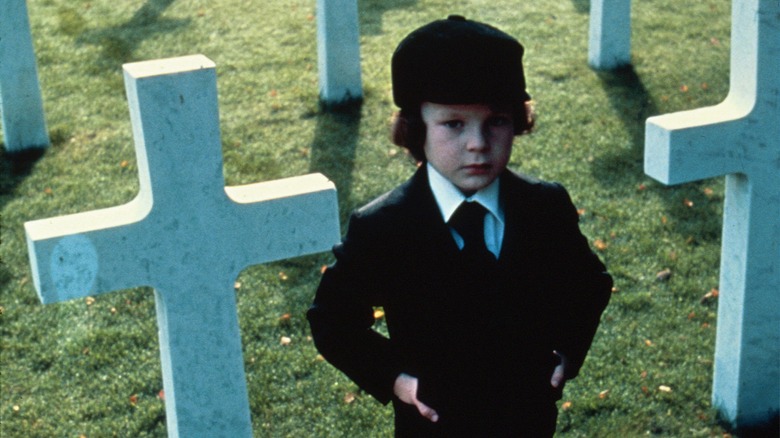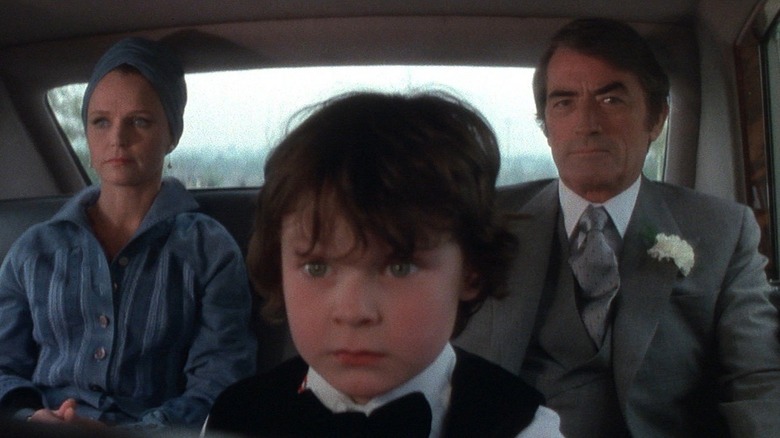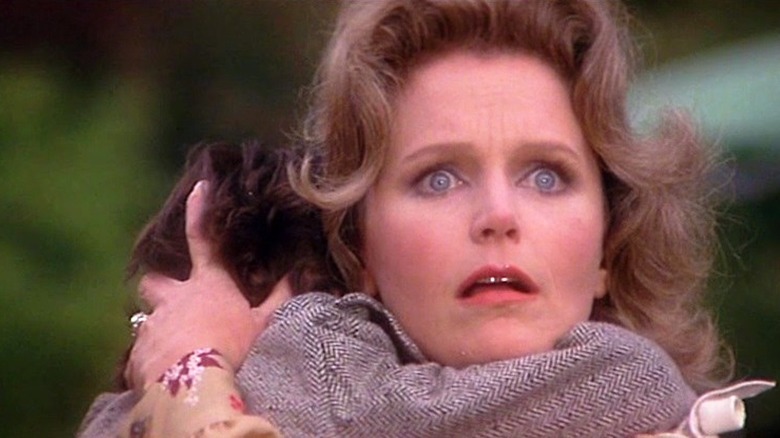Richard Donner Didn't Want To Approach The Omen As A Horror Film
If a script involves the antichrist, gruesome deaths, and one spiraling towards insanity as they question whether or not their child is evil, it's safe to conclude the film can be categorized as horror. However, director Richard Donner took a delicate approach when he asked renowned actor Gregory Peck to be a lead role in his 1976 film "The Omen," the fourth film in Donner's directorial career. Donner's filmography is filled with successful and treasured films like "The Goonies". "Scrooged", and "Lethal Weapon." While his work has comedic elements, "The Omen" was far from a feel-good film and yet Donner desperately wanted Peck ("To Kill a Mockingbird", "Roman Holiday") on board. In order to convince the highly sought-after and acclaimed actor to accept the role, Donner took a grey-area approach and tread lightly about how the film would be categorized.
We'll never call it a horror film
In an interview with TheLipTV, Donner explains that he went to Peck's house to discuss the script for "The Omen," written by screenwriter David Seltzer. Donner revealed that he told Peck, "the only thing I can say is that it's not a horror film. This is a mystery suspense thriller that is this real or have we driven your character so insane through these incidents of the wife ... falls out of a hospital ... It's coincidence until there's so many questions it's driving you crazy." Donner added that Peck liked that pitch and added that they'd never call the movie "a horror film." Donner agreed.
Decades later, it's almost comical to know that "The Omen" was pitched as a "mystery suspense thriller." Perhaps that description helped convince Peck because of his previous work with Alfred Hitchcock in his 1945 film "Spellbound." Donner also kept Peck's personal experience in mind as he tried to secure the actor's involvement in the film. Peck suffered a devastating loss with the death of his son in 1975, not long before production started on "The Omen." Peck also identified as a Roman Catholic and is laid to rest at the Cathedral of Our Lady of the Angels, a Roman Catholic cathedral in Los Angeles. He had the chance to portray a priest on screen in "The Keys of the Kingdom", a performance that earned him his first Academy Award nomination for Best Actor in 1944. However, it was "The Omen" that provided Peck with the biggest box office hit of his career, grossing over $60 million in the United States.
Thrills, kills, and chills
In an interview with Jim Whaley on "Cinema Showcase," Peck states that one thing that made him happy was that young people were responding to "The Omen" and it was a kind of "rollercoaster ride with thrills and suspense." He also speaks to the comparisons of "The Exorcist" and "Rosemary's Baby," two famous horror films but he does not use the word "horror" specifically. Instead, he says the team set out to "scare people half out of their wits."
The division between horror and thriller has been exhaustingly analyzed. There are several overlaps and a lot boils down to semantics. Some moviegoers will say they love thrillers but do not like horror films (oh, but they do love "Get Out"). For the average audience, it's easy to lump films under one category without taking sub-genres or nuance into consideration. One of the biggest arguments is that thrillers are meant to elicit suspense and excitement while horror films conjure fear. With beloved '90s thrillers like "The Good Son," "Cape Fear," and "The Crush," there is a sense of realism that can sometimes be missing in horror.
Usually, thrillers don't have paranormal elements and are more psychological or true crime in nature. However, those storylines are terrifying because they are plausible. Home invasions, kids with homicidal tendencies, serial killers, and obsessive love interests have all been stories that have crossed the headlines. Despite genre frameworks, there will always be an argument about what constitutes a thriller and a horror film. In the end, films that elicit any type of emotional response and thought-provoking dialogue are worthwhile despite the label cast upon them.


